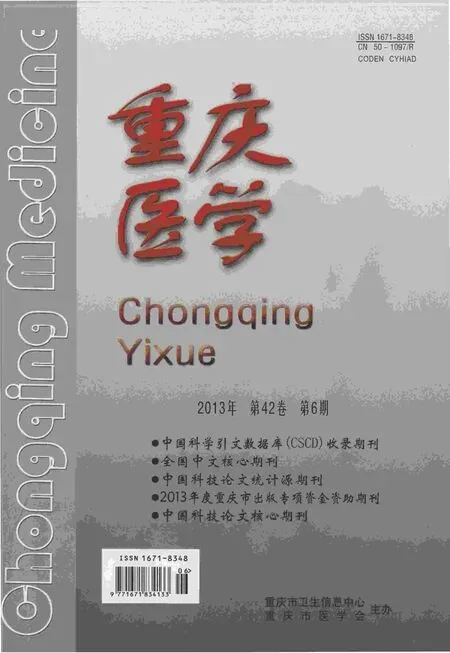白藜芦醇与乳腺癌相关研究进展*
2013-04-01郭慧琳综述张献全审校
郭慧琳 综述,张献全审校
(重庆医科大学附属第二医院肿瘤科 400010)
白藜芦醇(resveratrol)是广泛存在于葡萄、虎杖、花生等多种植物中的一种含有芪类结构的非黄酮类多酚化合物,以新鲜葡萄皮中含量最高,其化学名称为3,5,4′-三羟基二苯乙烯(3,5,4′-trihydrolystilbence),分子式为 C14H12O3,相对分子质量228.25。研究表明白藜芦醇的药理作用广泛,具有抗突变、抗氧化等多种生物学活性和药理作用[1]。近年来,白藜芦醇的强大抗肿瘤活性受到广泛重视。研究发现白藜芦醇对肺癌、肝癌、前列腺癌等多种肿瘤具有显著抗瘤效应[2]。乳腺癌是女性最常见的恶性肿瘤之一,白藜芦醇对乳腺癌的多种生物学作用尤为引人关注。研究证实白藜芦醇对乳腺癌具有抑制增殖、诱导凋亡及抑制肿瘤侵袭和迁徙等生物学效应。本文拟就白藜芦醇与乳腺癌相关研究做一综述。
1 白藜芦醇抑制乳腺癌细胞增殖及机制
研究证实白藜芦醇在多种乳腺癌细胞中均具有明显抑制增殖效应。在雌激素阳性(ER+)乳腺癌细胞(MCF-7)中,白藜芦醇能够以浓度依赖方式(10~50μmol/L)有效抑制 MCF-7细胞增殖,其中50μmol/L浓度对乳腺癌细胞的增殖抑制率能够达到70%以上[3]。白藜芦醇对他莫昔芬抵抗的 MCF-7细胞也具有明显抑制增殖作用[4]。在雌激素阴性(ER-)乳腺癌细胞(MDA-MB-231)中,白藜芦醇同样以浓度和时间依赖性方式导致MDA-MB-231细胞的增殖抑制,而且还有效降低乳腺癌细胞活力,其中小剂量(10μmol/L)作用后细胞活力保持80.3%,大剂量(100μmol/L)作用后细胞活力降至27.3%[5]。上述效应在裸鼠乳腺癌移植瘤体内实验中也得到了证实。Sareen等[6]证实口服白藜芦醇(50mg·kg-1·d-1)5周后,能够有效降低乳腺癌移植瘤大小1倍。还有研究也发现包括白藜芦醇在内的葡萄多酚类复合物能够有效抑制裸鼠乳腺癌移植瘤生长[7]。
白藜芦醇抑制乳腺癌细胞增殖具有多种信号机制。Hsieh等[8]研究发现白藜芦醇对ER+和ER-乳腺癌细胞均有抑制效应,而且抑制效应的信号途径具有较大相似性。白藜芦醇通过激活MAPKp38或ERK等激酶途径,导致p53激活,从而促使乳腺癌细胞的细胞周期停滞与相应的DNA修复。同时,白藜芦醇还通过抑制乳腺癌细胞ER表达水平,干扰ER相关信号,进而抑制与ER相关的乳腺癌细胞增殖[4]。另外,白藜芦醇抑制乳腺癌细胞增殖的机制还包括:上调沉默信息调节因子1(SIRT1)表达,通过SIRT1依赖的途径激活AMPK激酶活性;诱导钠氢交换体(NHE-1和NHE-3)表达;调节Akt与caspase9信号分子等[9-10]。
2 白藜芦醇诱导乳腺癌细胞凋亡及机制
白藜芦醇在诱导乳腺癌细胞凋亡中同样具有重要生物学作用。Nguyen等[11]发现在高转移度乳腺癌细胞(MDA231)中,白藜芦醇能够有效诱导 MDA231细胞凋亡,10μmol/L和50μmol/L作用量的诱导凋亡率分别为(14.2±1.3)%和(70.2±2.1)%。其他研究也发现100μmol/L白藜芦醇作用96h后,MDA-MB-231和 MCF-7细胞的凋亡率分别从1.3%和0.9%增加到52%和45%,提示白藜芦醇对ER+和ER-乳腺癌细胞均具有诱导凋亡的生物学效应[6]。
研究发现白藜芦醇可以通过caspase依赖或非依赖的方式诱导乳腺癌细胞凋亡。Alkhalaf等[12]发现白藜芦醇作用后,caspase 3活性增加5倍,提示白藜芦醇诱导乳腺癌细胞凋亡效应依赖于caspase 3信号途径。也有研究报道虽然白藜芦醇能够降低线粒体膜电位,增加活性氧(ROS)与一氧化氮(NO)产量,从而诱导凋亡,但是其诱导凋亡作用却独立于caspase信号机制。进一步研究证实白藜芦醇通过抑制ER依赖的PI3K途径,影响核转录因子-κB(NF-κB)转录活性,从而调节B细胞淋巴瘤/白血病基因-2(Bcl-2)表达,但该作用独立于caspase 3-/8分子机制[13]。除此之外,白藜芦醇诱导乳腺癌细胞凋亡的分子机制还包括:抑制Src-Stat3信号途径、调节钙离子与钙调蛋白启动的细胞死亡途径等[6,14]。但是也有研究报道白藜芦醇诱导乳腺癌细胞凋亡的效应可能与细胞类型有关,Pozo-Guisado等[15]发现白藜芦醇只能在抑制增殖的同时,诱导MCF-7细胞凋亡,而不能诱导MDA-MB-231细胞凋亡的发生。
3 白藜芦醇抑制乳腺癌细胞迁徙和侵袭及机制
乳腺癌细胞迁徙和侵袭在乳腺癌的发病与转移机制中具有重要意义。多个研究发现白藜芦醇能够有效抑制多种因素诱导的乳腺癌细胞迁徙和侵袭。白藜芦醇(5μmol/L,15 μmol/L)可以通过EGFR/PI3K途径,抑制基质金属蛋白酶-9(MMP-9)表达,最终抑制EGF诱导的 MDA-MB-231细胞迁徙[16]。该效应在其他实验中也得到证实。Azios等[17]证实白藜芦醇可以抑制雌二醇和表皮生长因子(EGF)诱导的 MDAMB-231细胞迁徙,该效应与白藜芦醇抑制细胞骨架蛋白,调节细胞表面肌动蛋白结构,降低黏着斑和黏着斑激酶(focal adhesion kinase,FAK)活性有关。
白藜芦醇还可以抑制生长因子heregulin-β1(HRG-β1)和IGF-1诱导的乳腺癌细胞迁徙和侵袭。Tang等[18]发现白藜芦醇可以抑制HRG-β1诱导的 MMP-9蛋白表达与MCF-7乳腺癌细胞的侵袭,该作用与白藜芦醇对MAPK/ERK信号途径的调节有关,但是与HRG-β1诱导的HER2受体磷酸化水平等无关。该研究小组还发现白藜芦醇可以抑制IGF-1诱导的ER阴性MDA-MB435乳腺癌细胞的迁徙和侵袭,该效应与抑制PI3K/AKT信号以及抑制 MMP-2蛋白表达有关[19]。另外,白藜芦醇衍生物LYR71也能够通过降低STAT3介导的MMP-9表达,从而抑制正常T细胞表达和分泌因子(RANTES)作用后促进的MDA-MB-231迁徙和侵袭[20]。
4 白藜芦醇对乳腺癌的其他生物学效应
白藜芦醇除了对乳腺癌细胞的上述生物学作用之外,还能够显著增强多种化疗药物的抗瘤效应。50μmol/L白藜芦醇可以明显增强环磷酰胺对MCF-7细胞的抑制增殖、诱导凋亡[21]。白藜芦醇能够明显增强 mTOR抑制剂雷帕霉素对MCF-7和MDA-MB-231乳腺癌细胞的抗瘤效应,还可以预防雷帕霉素抵抗的发生,可以明显增加雷帕霉素对乳腺癌细胞的抑制增殖效应[22]。同时,白藜芦醇还可以提高环磷酰胺、肿瘤坏死因子等多种药物对乳腺癌细胞的促凋亡效应[23-24]。但是也有相反报道发现白藜芦醇抑制了紫杉醇对MDA-MB-435s,MDA-MB-231和SKBR-3等多种乳腺癌细胞的抗瘤作用,但在MCF-7细胞中没有发现类似现象,提示该特殊效应可能与乳腺癌细胞类型有关[25]。另外,白藜芦醇对乳腺癌细胞还具有其他多种生物学效应,如对MCF-7细胞同时具有辐射保护和抗瘤效应的双功能性质[26],提高乳腺癌细胞乳腺癌易感基因1(BRCA1)等多种抑癌基因的有效表达[27-28];以caspase非依赖性的细胞死亡机制诱导乳腺癌细胞的自噬作用[29],下调端粒酶的活性等[30]。
5 展 望
综上所述,白藜芦醇对乳腺癌细胞具有明确的抑制增殖、诱导凋亡以及抑制肿瘤侵袭和迁徙等多种药理作用。人群研究也证实白藜芦醇与乳腺癌发病率呈相反关联[31]。同时,白藜芦醇还具有安全性较高、毒副作用较小等优点。因此,随着国内外学者的深入研究,白藜芦醇在乳腺癌的预防和治疗中将会有更加广阔的前景,并为乳腺癌的防治提供了新的思路。
[1]Ungvari Z,Sonntag WE,de Cabo R,et al.Mitochondrial protection by resveratrol[J].Exerc Sport Sci Rev,2011,39(3):128-132.
[2]Fulda S.Resveratrol and derivatives for the prevention and treatment of cancer[J].Drug Discov Today,2010,15(17/18):757-765.
[3]Hsieh TC,Wu JM.Suppression of cell proliferation and gene expression by combinatorial synergy of EGCG,resveratrol and gamma-tocotrienol in estrogen receptor-positive MCF-7breast cancer cells[J].Int J Oncol,2008,33(4):851-859.
[4]De Amicis F,Giordano F,Vivacqua A,et al.Resveratrol,through NF-Y/p53/Sin3/HDAC1complex phosphorylation,inhibits estrogen receptor alpha gene expression via p38MAPK/CK2signaling in human breast cancer cells[J].FASEB J,2011,25(10):3695-3707.
[5]Alkhalaf M.Resveratrol-induced growth inhibition in MDAMB-231breast cancer cells is associated with mitogen-activated protein kinase signaling and protein translation[J].Eur J Cancer Prev,2007,16(4):334-341.
[6]Sareen D,Darjatmoko SR,Albert DM,et al.Mitochondria,calcium,and calpain are key mediators of resveratrol-induced apoptosis in breast cancer[J].Mol Pharmacol,2007,72(6):1466-1475.
[7]Schlachterman A,Valle F,Wall KM,et al.Combined resveratrol,quercetin,and catechin treatment reduces breast tumor growth in a nude mouse model[J].Transl Oncol,2008,1(1):19-27.
[8]Hsieh TC,Wong C,John Bennett D,et al.Regulation of p53and cell proliferation by resveratrol and its derivatives in breast cancer cells:an in silico and biochemical approach targeting integrinαvβ3[J].Int J Cancer,2011,129(11):2732-2743.
[9]Lin JN,Lin VC,Rau KM,et al.Resveratrol modulates tumor cell proliferation and protein translation via SIRT1-dependent AMPK activation[J].J Agric Food Chem,2010,58(3):1584-1592.
[10]Li Y,Liu J,Liu X,et al.Resveratrol-induced cell inhibition of growth and apoptosis in MCF7human breast cancer cells are associated with modulation of phosphorylated Akt and caspase-9[J].Appl Biochem Biotechnol,2006,135(3):181-192.
[11]Nguyen TH,Mustafa FB,Pervaiz S,et al.ERK1/2activation is required for resveratrol-induced apoptosis in MDAMB-231cells[J].Int J Oncol,2008,33(1):81-92.
[12]Alkhalaf M,El-Mowafy A,Renno W,et al.Resveratrolinduced apoptosis in human breast cancer cells is mediated primarily through the caspase-3-dependent pathway[J].Arch Med Res,2008,39(2):162-168.
[13]Pozo-Guisado E,Merino JM,Mulero-Navarro S,et al.Resveratrol-induced apoptosis in MCF-7human breast cancer cells involves a caspase-independent mechanism with downregulation of Bcl-2and NF-kappaB[J].Int J Cancer,2005,115(1):74-84.
[14]Kotha A,Sekharam M,Cilenti L,et al.Resveratrol inhibits Src and Stat3signaling and induces the apoptosis of malignant cells containing activated Stat3protein[J].Mol Cancer Ther,2006,5(3):621-629.
[15]Pozo-Guisado E,Alvarez-Barrientos A,Mulero-Navarro S,et al.The antiproliferative activity of resveratrol results in apoptosis in MCF-7but not in MDA-MB-231human breast cancer cells:cell-specific alteration of the cell cycle[J].Biochem Pharmacol,2002,64(9):1375-1386.
[16]Lee MF,Pan MH,Chiou YS,et al.Resveratrol modulates MED28(Magicin/EG-1)expression and inhibits epidermal growth factor(EGF)-induced migration in MDA-MB-231human breast cancer cells[J].J Agric Food Chem,2011,59(21):11853-11861.
[17]Azios NG,Dharmawardhane SF.Resveratrol and estradiol exert disparate effects on cell migration,cell surface actin structures,and focal adhesion assembly in MDA-MB-231 human breast cancer cells[J].Neoplasia,2005,7(2):128-140.
[18]Tang FY,Chiang EP,Sun YC.Resveratrol inhibits heregulin-beta1-mediated matrix metalloproteinase-9expression and cell invasion in human breast cancer cells[J].J Nutr Biochem,2008,19(5):287-294.
[19]Tang FY,Su YC,Chen NC,et al.Resveratrol inhibits migration and invasion of human breast-cancer cells[J].Mol Nutr Food Res,2008,52(6):683-691.
[20]Kim JE,Kim HS,Shin YJ,et al.LYR71,a derivative of trimeric resveratrol,inhibits tumorigenesis by blocking STAT3-mediated matrix metalloproteinase 9expression[J].Exp Mol Med,2008,40(5):514-522.
[21]Singh N,Nigam M,Ranjan V,et al.Resveratrol as an adjunct therapy in cyclophosphamide-treated MCF-7cells and breast tumor explants[J].Cancer Sci,2011,102(5):1059-1067.
[22]He X,Wang Y,Zhu J,et al.Resveratrol enhances the anti-tumor activity of the mTOR inhibitor rapamycin in multiple breast cancer cell lines mainly by suppressing rapamycin-induced AKT signaling[J].Cancer Lett,2011,301(2):168-176.
[23]Singh N,Nigam M,Ranjan V,et al.Caspase mediated enhanced apoptotic action of cyclophosphamide-and resveratrol-treated MCF-7cells[J].J Pharmacol Sci,2009,109(4):473-485.
[24]Fulda S,Debatin KM.Sensitization for tumor necrosis factor-related apoptosis-inducing ligand-induced apoptosis by the chemopreventive agent resveratrol[J].Cancer Res,2004,64(1):337-346.
[25]Fukui M,Yamabe N,Zhu BT.Resveratrol attenuates theanticancer efficacy of paclitaxel in human breast cancer cells in vitro and in vivo[J].Eur J Cancer,2010,46(10):1882-1891.
[26]Bader Y,Getoff N.Effect of resveratrol and mixtures of resveratrol and mitomycin C on cancer cells under irradiation[J].Anticancer Res,2006,26(6):4403-4408.
[27]Fustier P,Le Corre L,Chalabi N,et al.Resveratrol increases BRCA1and BRCA2mRNA expression in breast tumour cell lines[J].Br J Cancer,2003,89(1):168-172.
[28]Waite KA,Sinden MR,Eng C.Phytoestrogen exposure elevates PTEN levels[J].Hum Mol Genet,2005,14(11):1457-1463.
[29]Scarlatti F,Maffei R,Beau I,et al.Role of non-canonical Beclin 1-independent autophagy in cell death induced by resveratrol in human breast cancer cells[J].Cell Death Differ,2008,15(8):1318-1329.
[30]Lanzilli G,Fuggetta MP,Tricarico M,et al.Resveratrol down-regulates the growth and telomerase activity of breast cancer cells in vitro[J].Int J Oncol,2006,28(3):641-648.
[31]Levi F,Pasche C,Lucchini F,et al.Resveratrol and breast cancer risk[J].Eur J Cancer Prev,2005,14(2):139-142.
